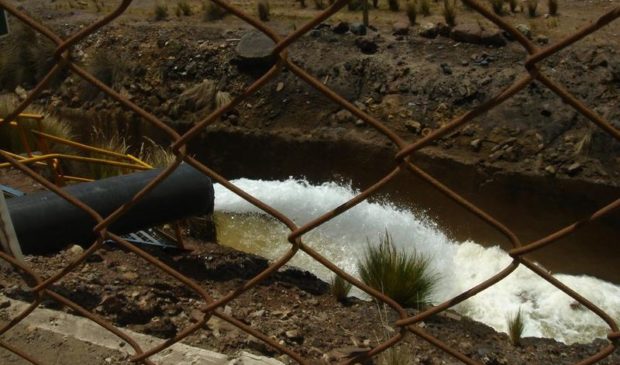Dripping Springs still seeking effluent permit
Friday, November 4, 2016 by
Jo Clifton The city of Austin is continuing efforts to convince Dripping Springs not to go through with its plan to release treated effluent into Onion Creek, the tributary that provides the greatest amount of direct recharge to Barton Springs, according to Chris Herrington, chief engineer for the city’s Watershed Protection Department.
The city continues to prepare for a contested case hearing at the Texas Commission on Environmental Quality, in case that becomes necessary, Herrington said. The TCEQ has issued a draft permit to Dripping Springs allowing the Hays County city to discharge 995,000 gallons of effluent per day into Walnut Springs Creek, a tributary of Onion Creek.
“Even highly treated effluent has excessive concentrations of nutrients and will cause water quality degradation in Hill Country creeks,” Herrington told City Council on Thursday. The city of Austin has spent $66 million to purchase more than 11,000 acres of water quality protection land in the Onion Creek watershed. In addition to recharging Barton Springs, Herrington said, Onion Creek recharges the Trinity and Edwards aquifers.
In response to Herrington’s briefing Thursday on the effects of Dripping Springs’ plan to dump treated effluent into Onion Creek, Council Member Don Zimmerman said that no one on Council had the background in chemistry or hydrology “sufficient to comprehend all the factors here.”
Herrington said Austin has been studying Onion Creek since the 1990s. “We have an extensive database … and have used the most advanced water quality simulation available,” he said.
Still, Zimmerman said he wanted more information from scientists working on behalf of Dripping Springs. However, none of his colleagues indicated that they needed to hear from more scientists.
Council Member Delia Garza said that she wanted as much information as possible but that she didn’t think she needed to be a chemist to understand that Dripping Springs wants to put “treated poop … into our water.”
Following the briefing, the Austin Monitor interviewed two attorneys, Dan Wheelus and Stuart Henry, who represent landowners opposed to Dripping Springs’ plan.
Wheelus said he represents owners of significant amounts of property, including the Keller family and the family of philanthropist Roberta Crenshaw. When they found out about Dripping Springs’ plan, Wheelus said, he notified the city of Austin as well as the Lower Colorado River Authority, and they have been working together to try to prevent Dripping Springs from putting its effluent into the creek.
One of Wheelus’ clients gave Dripping Springs $175,000 to pay for a study of other methods to deal with the effluent. Wheelus said, “They studied other methods, including direct potable reuse,” which allows for treatment of effluent to the level of drinking water, but it’s expensive. In addition, Wheelus said one of the downstream property owners “purchased 186 acres of land that they could use, for a nominal expense … so that they would have an additional number of acres that they would have available to them to irrigate so that they would not need to discharge into Onion Creek.”
Austin also sought a rule change at the TCEQ that would make it easier for Dripping Springs to irrigate with its effluent. The TCEQ has granted that change and is currently working on detailed regulations.
“As a result of the gifts and the land that was purchased, Dripping Springs has been engaged in settlement talks with me and with Chris (Herrington) for a little over a year now,” Wheelus said. “And we’re hopeful that we’re going to reach an agreement that will be protective of Onion Creek. We’re not there yet, but we hope to get there.”
However, Henry is not so hopeful. He represents a group of Hays County property owners who call themselves Protect Our Water and use the acronym POW. Henry said Dripping Springs has basically not changed its position in the past year. He said it is likely that TCEQ will grant the permit regardless of the evidence. “But we’re not going to roll over and play dead. We’re just getting started,” he concluded.
Ginger Faught, Dripping Springs’ deputy city administrator, told the Monitor via email, “We have no plans to pause. The City of Dripping Springs has been working on this project for the last 4 years. We have done our homework including evaluating multiple options and we feel that this is the best alternative for our growing community. We see our treated effluent as a resource that will allow us to meet our long term goals of maximizing beneficial reuse and ultimately direct potable reuse.
“To date, we have beneficial reuse contracts for approximately 600,000 gallons of the 995,000 gallon discharge permit. This is a significant number. Finally, we have followed the TCEQ process to the letter which will result in one of the most restrictive permits in the state. With all of this said, we will continue to have dialogue with interested stakeholders including the City of Austin.”
The Austin Monitor’s work is made possible by donations from the community. Though our reporting covers donors from time to time, we are careful to keep business and editorial efforts separate while maintaining transparency. A complete list of donors is available here, and our code of ethics is explained here.
You're a community leader
And we’re honored you look to us for serious, in-depth news. You know a strong community needs local and dedicated watchdog reporting. We’re here for you and that won’t change. Now will you take the powerful next step and support our nonprofit news organization?









